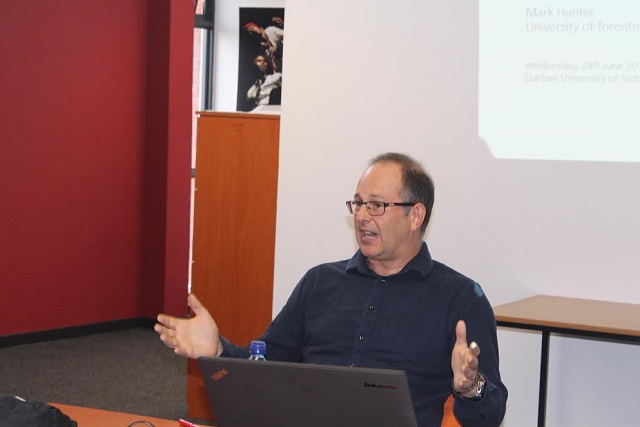Discussing the South African (Durban) schooling system, Professor Mark Hunter, Associate Professor at the University of Toronto and Honorary Research Fellow at the University of KwaZulu-Natal, said the structure of the system in South Africa was more like the one of Britain.
Prof Hunter’s presentation was conducted on Wednesday, (28 June 2017) at the Durban University of Technology’s Urban Futures Centre. The presentation was based on a book that is currently in progress that centrally focuses on the setup of the South African Schooling system (embedding schools and communities), the different communities in Durban and social class.
Prof Hunter said it was unusual for public schools to charge fees for tuition fees when education can be pretty much without a fee. “The education system has become the most marketed system in the world. Public schools are now charging school fees which are very unusual,” he said.
The presentation titled: ‘Entering Harry Potter’s Schools: Social Mobility among White Durbanites’ is a study focusing on UMlazi, Bluff and Berea. The methods of the study look at two mains which are families and the schools. Professor Hunter’s study traces back to the history of the South African schooling system, the time of the Group Areas Act, times of dividing races and comparing Black and White schools. Prof Hunter has been doing his study since 2012; he has done more than 400 interviews, however, he does not look specifically at schools.
According to Prof Hunter, there is a certain ‘elite’ social rating for those who had attended schools that were in the city. Furthermore, Prof Hunter believed that gender, class and race are also tied up in the system. “Money and race come together. The class is also a contributing factor since these schools are expensive. Schooling movement goes in reverse where families in UMlazi wanted their children to attend schools in the Bluff area, while those in the Bluff were going to schools in the Berea area because they felt that these schools were better than those in their areas,” he said.
Addressing the issue of social im/mobility among Whites, Prof Hunter argued that there was a need to make a conceptual shift from simply studying White people to studying whiteness and how we can think about race differently in schools. “We need to understand the dynamics of a semi-privatised schooling system that gives a high value to a school’s ‘White tone’. With important exceptions, including poorer children and children of single mothers, the market for schooling drives the daily movement of white learners from South Durban into more traditional and centrally located Harry Potter schools,” he said.
Furthermore, he (Prof Hunter) said there is a need to explore changes in family forms using concepts typically applied to Black, not White South Africans, such as the extended family. The talk concluded with thoughts on the role of schooling in South Africa’s race-class-space transformations.
Pictured: Prof Mark Hunter during his presentation on Wednesday, (28 June 2017) at the Urban Futures Centre.
Noxolo Memela


